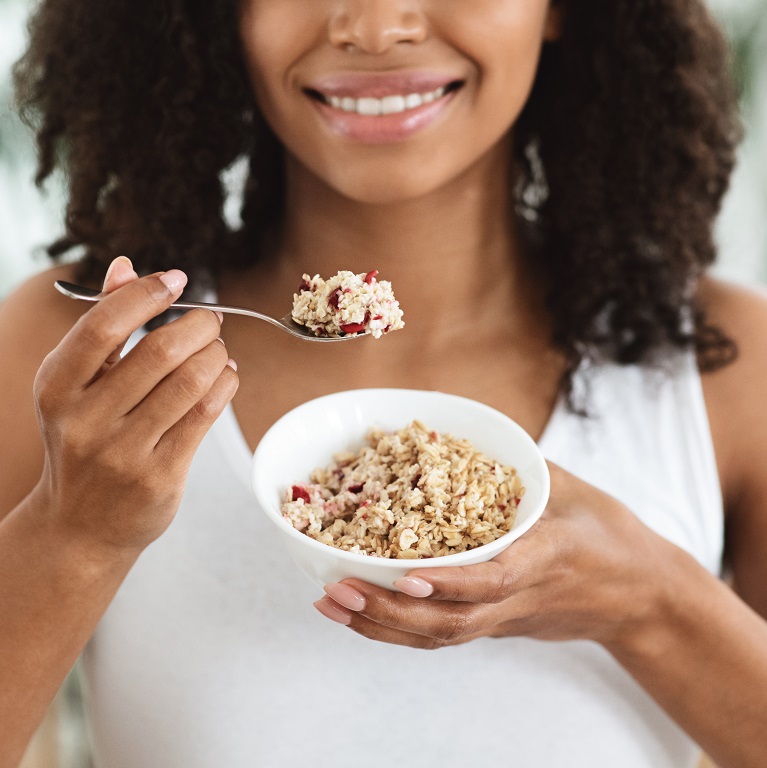A dietitian recommends various foods that give you energy (and a few to avoid)
March 23, 2023




Just like vehicles need fuel to get from one place to another, your body also needs fuel to have the energy to do anything.
For a car, that means gasoline or an electric charge to get the motor running. For us, it means food for energy. We get energy from the calories in the food we eat, whether it’s carbohydrates, fats or proteins. But not all calories are created equal.
Are calories energy? Sort of. Katie Throop, a registered dietitian and researcher for Nutrilite™ products, said energy that comes from food and beverages is measured in calories.
“Our metabolism is the process by which our body converts that energy – the calories – into fuel to survive and function normally,” Throop said. “Anything that has calories provides caloric energy to our body. However, not all foods impact our energy levels, that feeling of being energized, the same way.”
If we want to optimize our energy levels, we need to choose the right fuel for our bodies, Throop said.
“While most foods provide caloric energy, eating a wholesome diet rich in complex carbs, protein, fiber and healthy fats is the probably the best way to feel the most energized throughout the day and avoid energy slumps,” she said.
So, what are foods that give you energy?
“Nuts and seeds are some of the best foods to beat fatigue and fight hunger, especially chia seeds,” Throop said. “And complex carbohydrates paired with healthy fats for a more sustained energy release, like oatmeal with nuts or a piece of whole wheat toast with avocado.”
Fresh fruits and vegetables are always a good choice, as well as dairy like cottage cheese or low-sugar yogurt.
You should also consider foods high in B vitamins because they help our bodies unlock energy from the foods we eat, and iron-rich foods because iron helps transport oxygen through the body, supporting healthy energy levels. You can find those in eggs, broccoli, mustard greens, spinach and other leafy vegetables.
Protein provides energy along with fats and carbohydrates. It helps our bodies repair tissue, aids in the digestive process and helps our blood carry oxygen. Not getting enough of it can lead to feeling fatigued, so it’s an important part of a healthy diet.
Proteins are not known as natural energy boosters, but because they take longer to digest than carbohydrates, they make us feel fuller longer, providing another sustained source of energy.
Now for the opposite of energy food. Anything that is heavily processed or high in refined carbohydrates like pastries, pasta, white rice or snack chips are among the foods that make you tired. That’s because they may cause your blood glucose to spike and quickly crash, leaving you feeling anything but energized, Throop said.
“Foods that are high in sugar without any protein and fat along with it will make your blood sugar spike at first,” she said. “That will give you a quick energy burst, but then that blood sugar will take a dive and make you feel extra sluggish.”
Extra large meals can also bring you down as your body works on digesting them, so consider smaller portions with snacks in between.
Of course you need food for energy, but many other factors can affect whether or not you feel energized. In addition to giving your body the fuel it needs, here are some other natural energy boosters to help you stay ready to tackle each day.
STAY HYDRATED: Tiredness or fatigue can be symptoms of dehydration. Drinking plenty of water helps you stay alert and ready to roll. Keep a water bottle handy so you can take swigs throughout the day and choose water-rich foods like fresh fruits and vegetables. That will help you get the recommended daily intake of 15.5 cups (3.7 liters) of fluids for men and 11.5 cups (2.7 liters) for women.
GET HEALTHY SLEEP: Getting too little sleep or too much sleep can mess with your circadian rhythms and trigger feelings of fatigue when you least want them. Strive for healthy sleep habits that work for you.
EXERCISE REGULARLY: Keep moving, even when you don’t want to. The act of exercising spurs your body to create energy from the nutrients in your food and the air you breathe. It also increases oxygen circulation, which supports that energy production and helps your body operate more efficiently.
USE CAFFEINE WISELY: Yes, caffeine can help perk you up in the short term, but it may lead to sleep disruption later. Caffeine has a half-life of up to six hours, meaning that six hours after you’ve had that super-caffeinated concoction, half of that caffeine is still in your system.
Want to learn more about supporting your energy? Check out these additional tips, products and strategies.
By selecting cancel, the new IBO must complete the rest of the registration process, including payment. You will not be able to return to the payment option.
The new IBO will receive an email with a link to complete the process